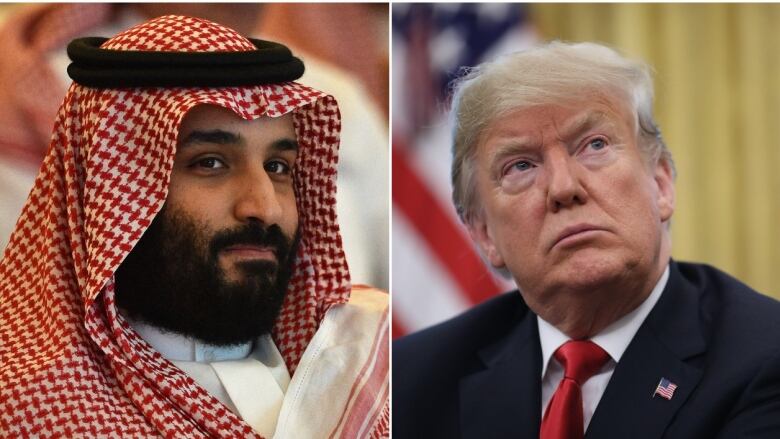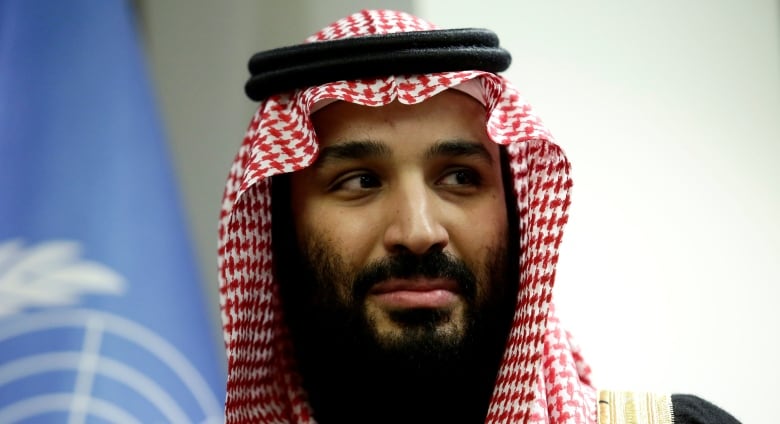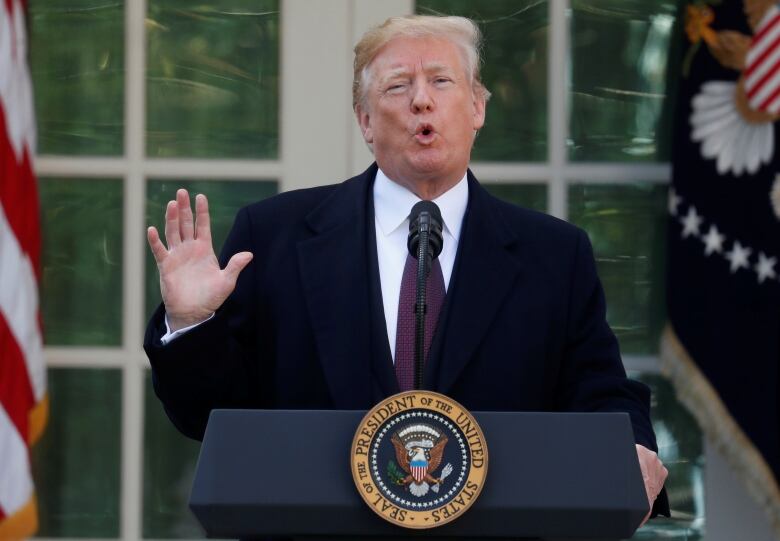'Maybe he did, maybe he didn't': What Trump surrendered by giving Saudi crown prince a pass in Khashoggi death
Economy seems to figure heavily in U.S. president's decision to stand by Saudi Arabia

He promised to be the "law and order" president. He pitched himself as the ultimate dealmaker.
Yet in a single White House statement, in which he gave Saudi Arabia's crown prince a pass for the killing and dismemberment of U.S.-based journalist Jamal Khashoggi, Donald Trump gave ammunition to his critics who say he lives up to neither reputation.
The bizarre White House communiquon Tuesday, blitzed with exclamation marks, undermined Trump's own intelligence community's conclusion that Saudi Arabia's Mohammed bin Salman, also known as MbS,ordered Khashoggi's killing, effectively absolving the Saudi royal and telegraphing unconditional support to Riyadh in the process.
"It could very well be that the crown prince had knowledge of this tragic event maybe he did and maybe he didn't!" the statement read. "That being said, we may never know all of the facts surrounding the murder of Mr. Jamal Khashoggi."
But the CIA says it knows who killed Khashoggi, a legal permanent resident of the U.S. entitled to protection:It points the finger at MbS, heir to the Saudi throne, for ordering the slaying inside a Saudi consulate in Turkey.

For those seeking some pragmatic rationale for why the president would forsake justice against Saudi Arabia for what should amount to an attack on U.S. sovereignty, Trump has cited a handful of American interests: stable oil prices, a lucrative arms deal, and the continued containment of Iran.
"At some point, things very positive, frankly, could happen with Iran," the president told reportersTuesday, justifying his need to retain a friendship with Riyadh. "But we also need a counterbalance.And Israel needs helpalso. If we abandoned Saudi Arabia, it would be a terrible mistake."
To say maybe he did and maybe he didnt, or that we are incapable of finding out the truth, or that knowing the truth our silence can be bought with arms sales, undermines the Presidency, credibility of our intelligence professionals, and our role as a champion of human rights. https://t.co/MZ3VginOcT
—@RepAdamSchiffHis decision not to punishMbSwasn't about capitulating to Riyadh, he insisted. It was about putting "America first."
"Saudi Arabia, if we broke with them, I think our oil prices would go through the roof," Trumpreasoned.
'Abandonment of American moral leadership'
His oft-repeated but unsubstantiated claim that the U.S. is countingon $450 billion worth ofSaudi arms deals over-inflates the $14.5 billion that has actually been promised. Some analysts have contended that, contrary to Trump's assertion that job numbers will be harmed by the cancellation of an arms deal, no jobs will be taken away if Saudi money for weapons disappeared.
Members of Congress have nevertheless urged Trump to at the very least cut off some arms sales to the Saudis.
"The Trump administration treats these arms sales like the golden goose that will somehow crash the American economy if those sales don't continue, which is completely ridiculous," said Jim Arkedis, a former intelligence analyst for the U.S. Department of Defence.

Arkedis read Tuesday's White House statement as more than a geopolitical howler. It was a "quintuple whammy" of embarrassments, he said.
"It's the abandonment of American moral leadership;it's a slap to the face of the U.S. intelligence community;it's a continuing war on the press;it's an obfuscation of truth about who actually did this;and it's the president coddling dictators."
Those tyrants will take notice, too, Arkedis said.
Trump has expressed personal admiration for strongmen presidents like Russia's Vladimir Putin and the Philippines' Rodrigo Duterte. Any petty dictator with political leverage may decide the White House is "extraordinarily weak and will let them conduct themselves in any manner that they see fit," he said.
Arkedis believes failure to take punitive action now exposes to the world not just the Saudis what this administration is willing to give up.
"The Trump administration is showing itself to be a weakling;a giant child that can't figure out how to maintain leverage over a strategic ally behaving extraordinarily badly."
Whether the price of checking Iran regionally is worth a "complete abdication of American moral leadership" is of great concern to Trump's critics, Arkedis said, asking at what pointdoes Trump's "blind preference for an alliance with Saudi Arabia start to cost America parts of its soul?"

Something else struck Robert Jervis, an international politics professor at Columbia University, when he read the White House statement.
"For a businessman who prides himself on making good deals, Trump gives up an enormous amount and gets almost nothing for it," he said.
Jervis noted, for example, that Trump's claim that the Saudis can opt to purchase weapons from the Russians or the Chinese if the Americans cut off supplies is "simply incorrect."
For one thing, the Saudis need more sophisticated weapons that Russia and China don't have, Jervis said, and the Saudi military is already dependent on American supplies, training and support. To suddenly force them to switch to Chinese or Russian weapons would interrupt supply chains, interfere with weapons compatibility, and require major retraining.
"When you mix stuff up, it's a real problem[overthe long-term],"Jervis said.
Giving power to Riyadh
He also said some regional experts believe the alleged 2017 kidnapping and suspected forced resignation of Lebanese Prime Minister SaadHariri by the Saudis only served to strengthen the position of Iran, Riyadh's regional rival in the Middle East.
The leader of Hezbollah, the Iran-backed faction, blasted Hariri'stemporary resignation he rescinded a month later as "a Saudi decision."
In that way, Jervis said, the reliance on Saudi Arabia "is not an effective anti-Iran strategy."
Beyond strategic alliances in the region, there's a personal affinity that Trump's son-in-law Jared Kushner appears to hold for MbS. Kushner, 37, has long cultivated a close kinship with the 33-year-old Saudi ruler and staked his hopes in Riyadh helping to resolve peace in the Middle East and containing Tehran.
The Washington Post, for which Khashoggi wrote, released a statement of its own on Tuesday afternoon, accusing Trump of "placing personal relationships and commercial interests above American interests in his desire to continue to do business as usual with the crown prince of Saudi Arabia."
For Trump to apparently forfeit the U.S. position as a defender of human rightsis disturbing to Jervis, who says he fears how Riyadh will interpret Tuesday's statement.
"He's telling Saudi Arabia, 'We need you so much, you can do anything,'" he said. "To me, that's not a good bargainer."












_(720p).jpg)


 OFFICIAL HD MUSIC VIDEO.jpg)
.jpg)



























































































